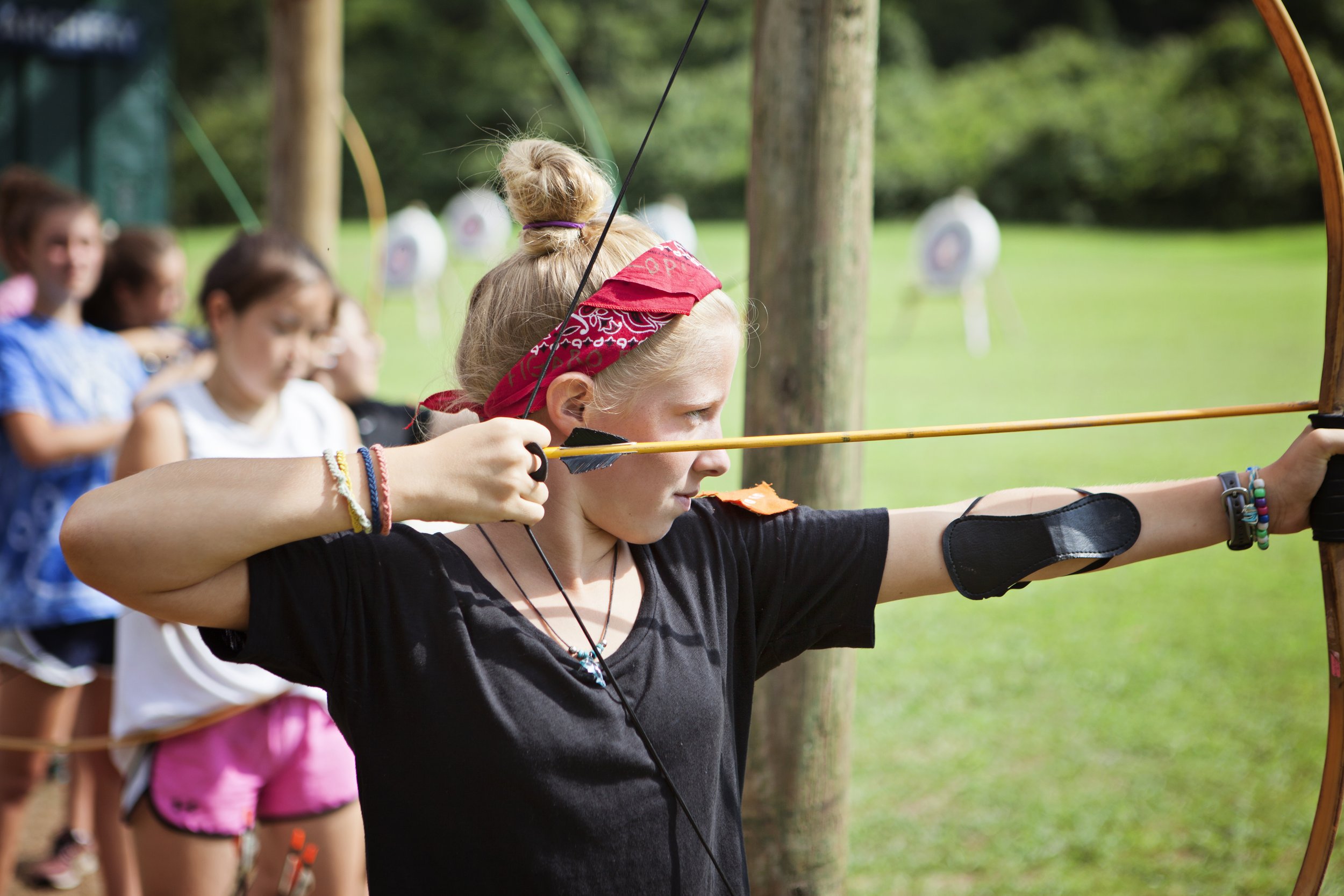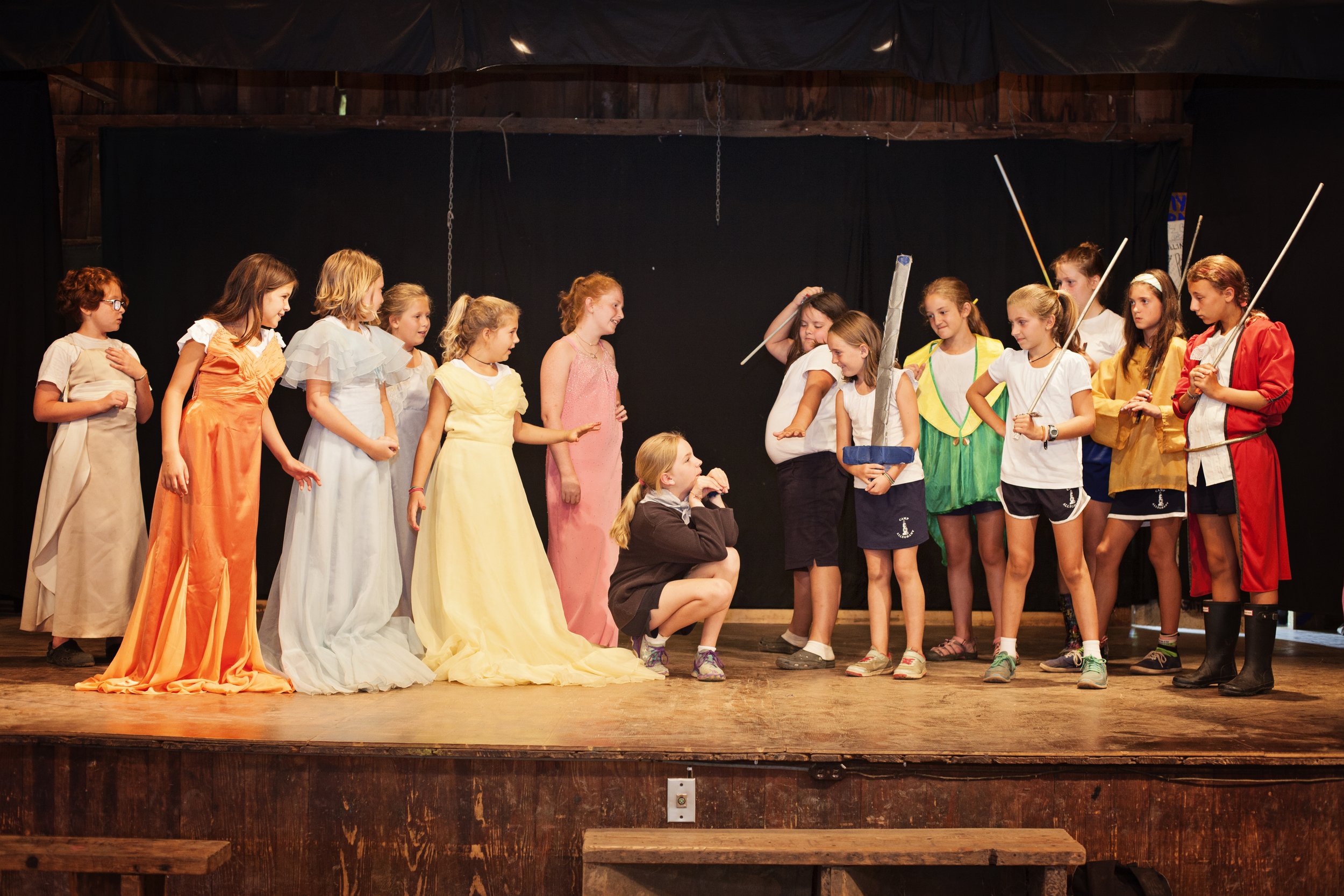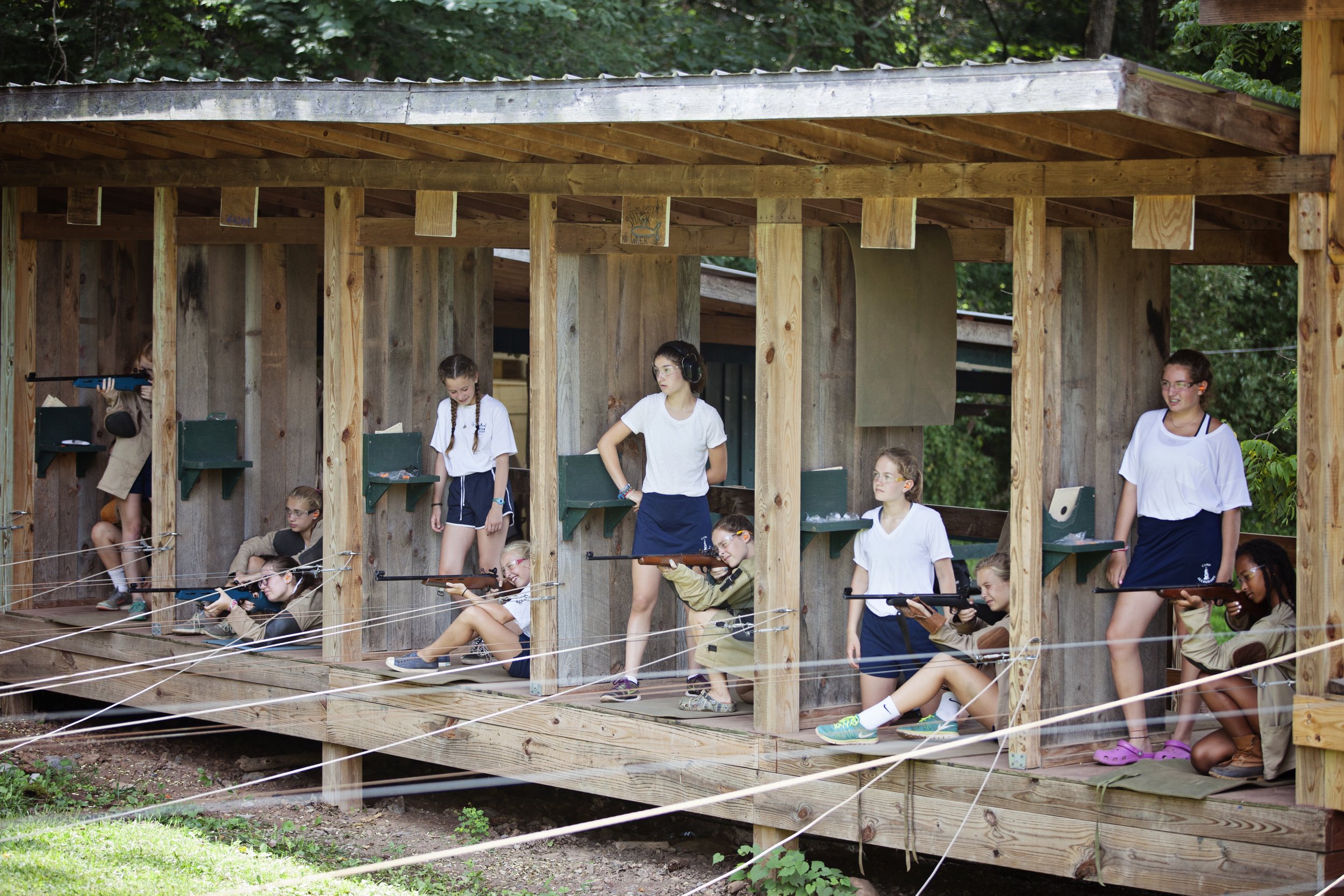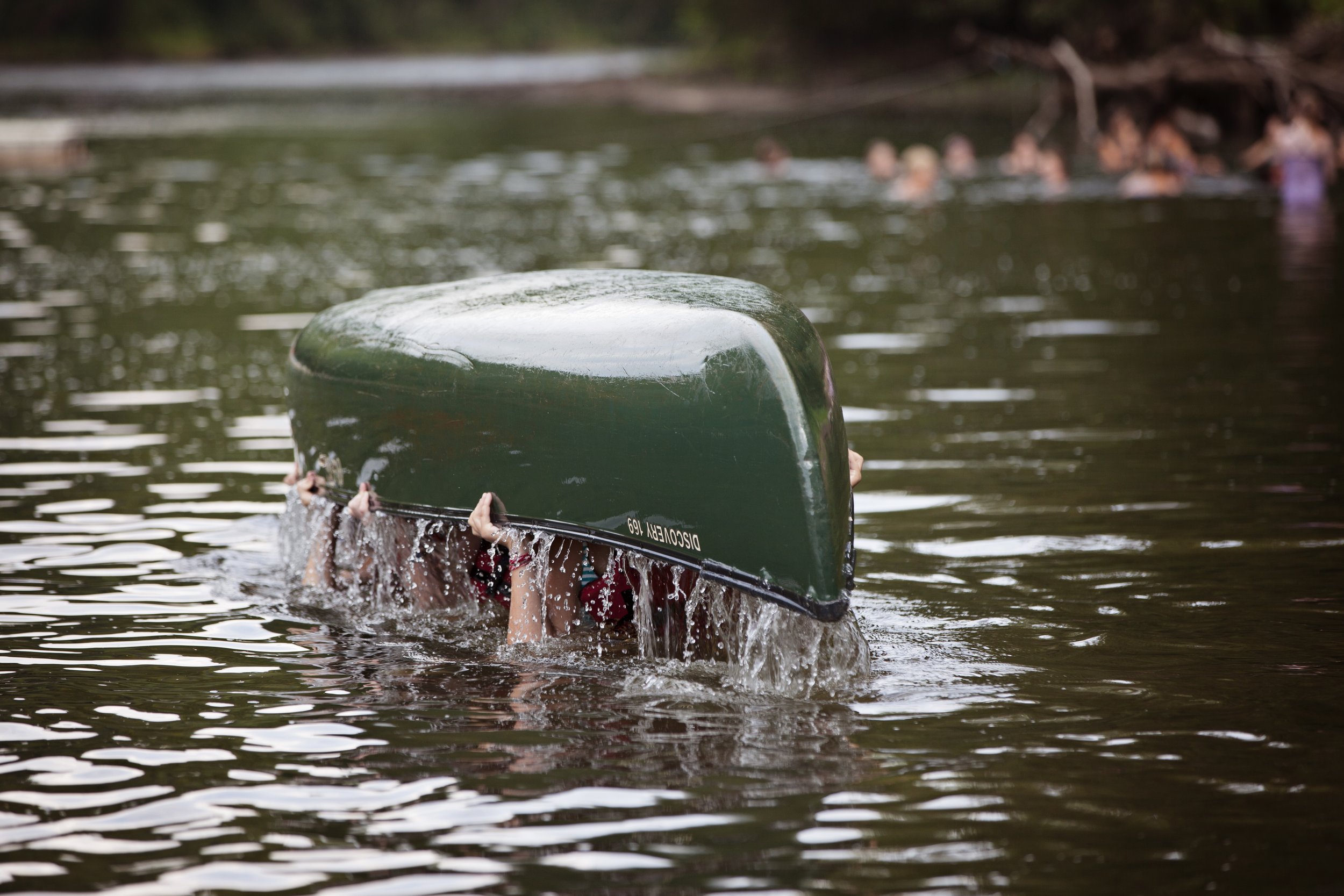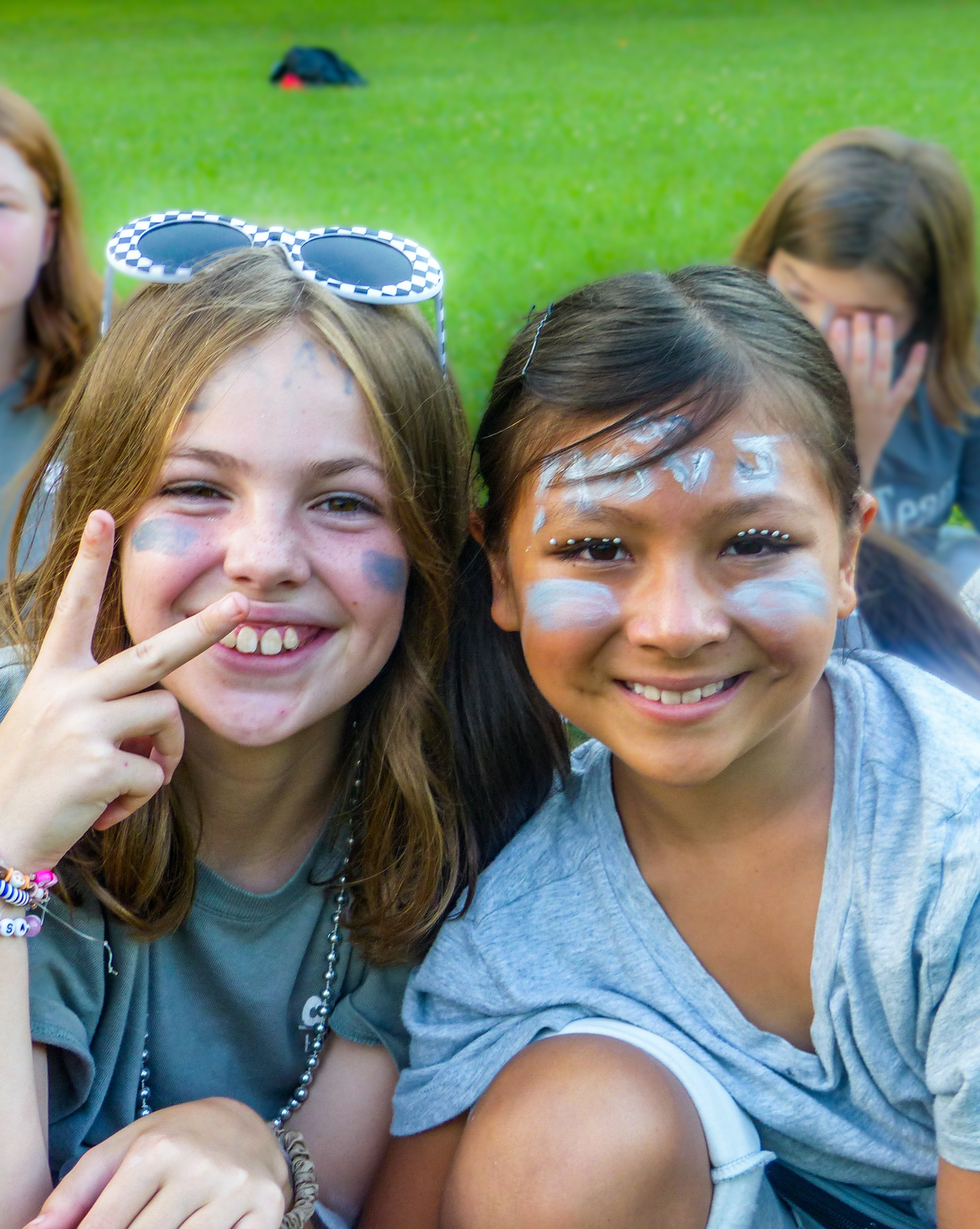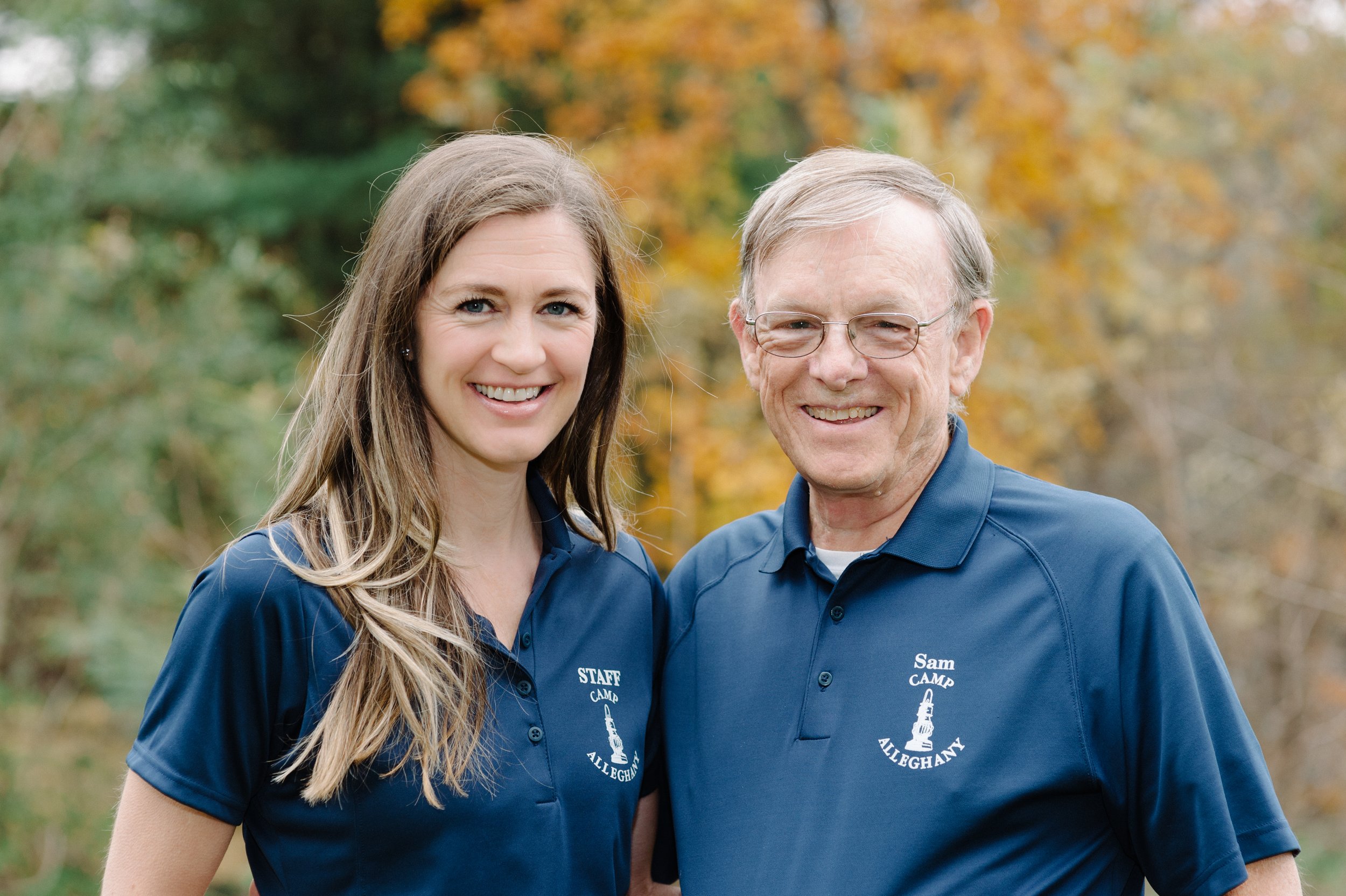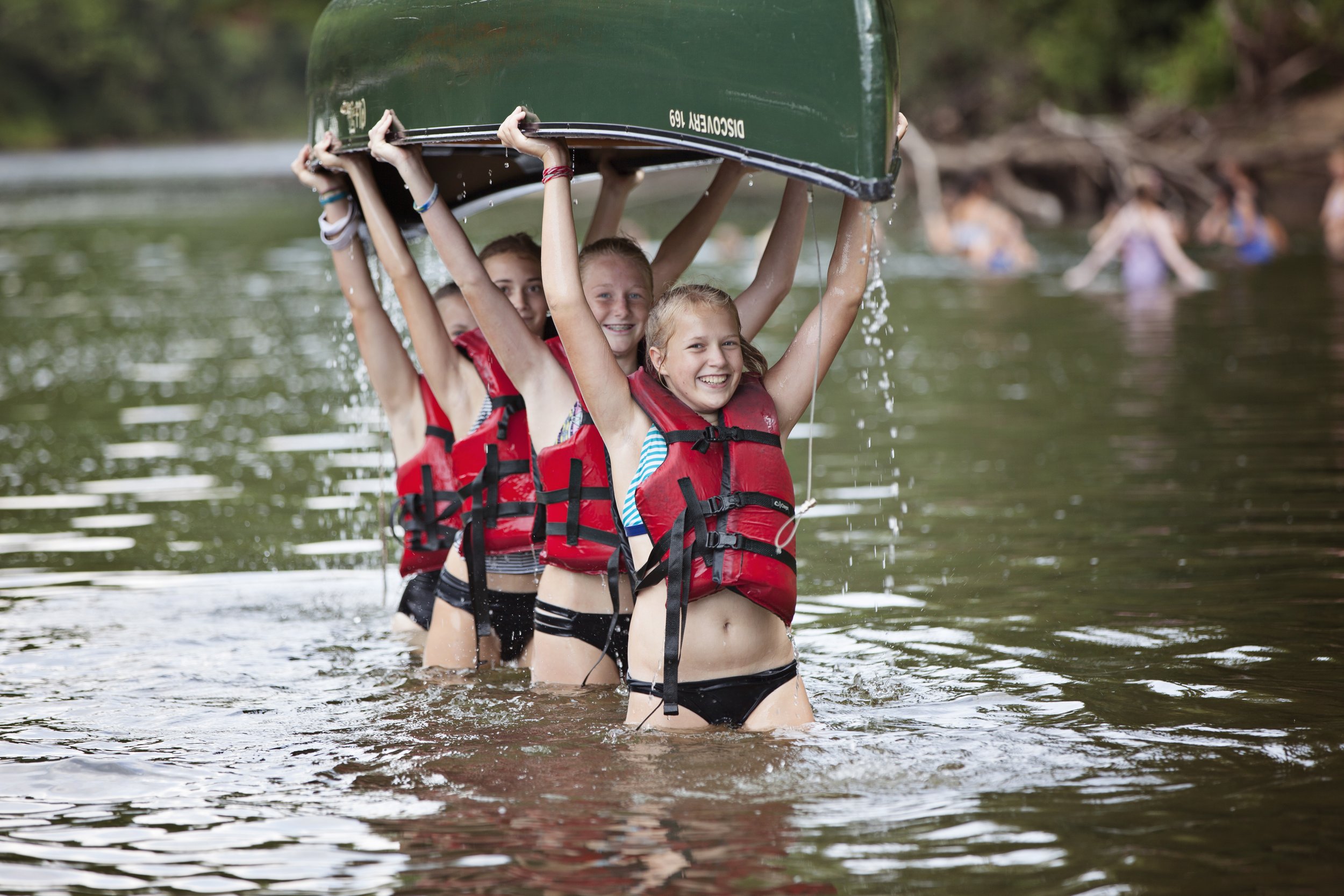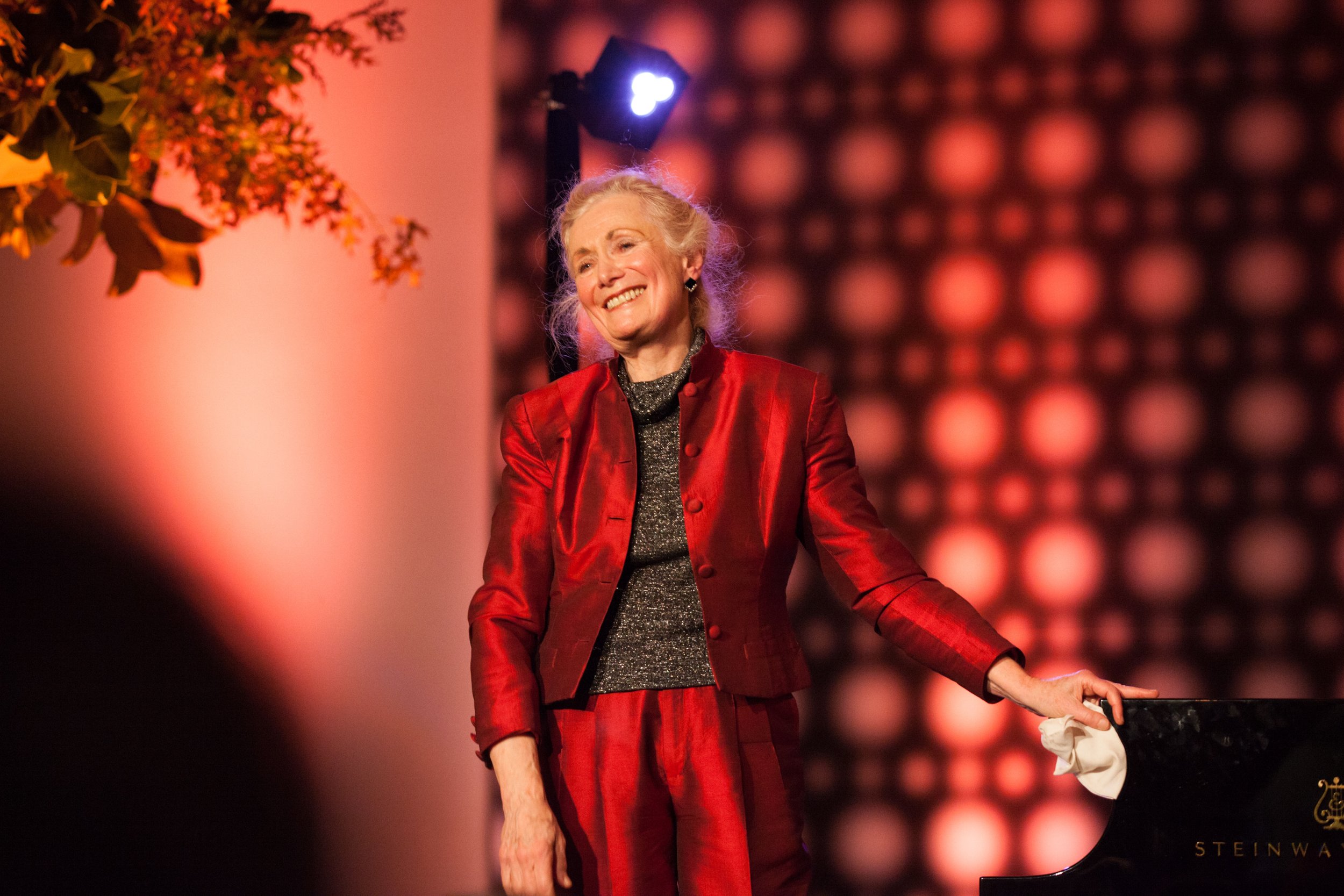Happy Campers
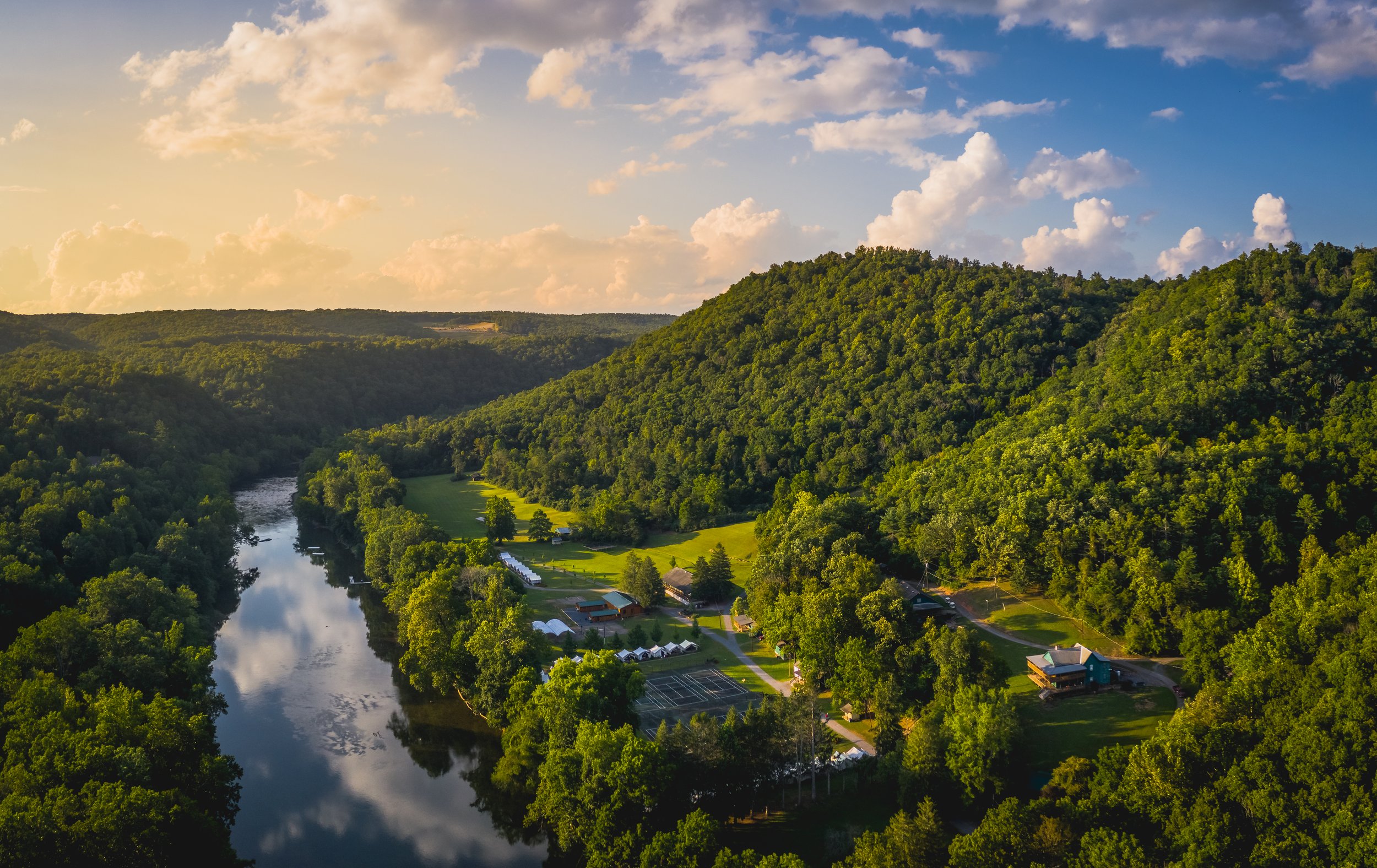
A Bird’s Eye View of Camp Alleghany along side the Greenbrier River
BY GREG JOHNSON | PHOTOS COURTESY OF CAMP ALLEGHANY
Every summer, over the course of eight weeks, 500 girls get on a steel barge and are poled across the Greenbrier River to a world many of them consider magical. It’s a place where friendships are formed, bonds are strengthened, skills are developed, and young women discover new aspects of themselves. The trip across the river to Camp Alleghany only takes a few minutes, but the journey is physical and metaphorical, and the memories tend to last a lifetime.
There aren’t any cell phones in this alternate universe. Social media, cosmetics, romance and drama, all staples of contemporary life, aren’t factors either. The campers sleep in tents and spend lots of time outdoors. None of these things would seem to be a winning recipe for attracting young people in the Twenty-first Century, but through the years this summer camp has continued to thrive. There’s obviously something special going on. Much of it is apparent, but some of it takes place behind the scenes.
For three generations Camp Alleghany for Girls has been owned and operated by the Dawson family. Cooper Dawson passed the reins to his son Sam and daughter-in-law Bonnie, who recently passed the directorship to their daughter Elizabeth Shreckhise. The Dawsons have literally grown up with the camp and know as much about running a successful one as anybody, anywhere.
At the end of the 2023 summer sessions, we sat down with Elizabeth and asked her what keeps things rolling along so smoothly. An articulate and thoughtful spokeswoman, she was more than willing to talk about what’s actually a year-round operation, as well as some of the challenges camps face in a rapidly changing world.
Greg Johnson: We published an article about Camp Alleghany in 2011. A lot of the camp’s traditions haven’t changed since then, but what’s new?
Elizabeth Shreckhise: For one thing we have some new structures. We built a two-story building for our offices and our camp store. We have a new Arts & Crafts lodge. We’ve doubled our bathroom/shower facilities. Program-wise, we’ve added a Mother-Daughter Weekend at the beginning of the season for girls ages 5-10. We call it mother-daughter, but it’s not restricted to moms. Girls can come with a grandmother or an aunt or a godmother, or even an older adult female friend. We’ve also added a Leaders-in-Training program for girls age 16. It’s a 6-week session that focuses on helping them develop leadership skills. We hope some of the girls who go through it will want to return as counselors.
GJ: What kinds of leadership skills?
ES: Public speaking, etiquette and manners, interview skills, time management, and even lifeguard certification. Our administrative team members explain their particular roles and the business side of things. Being here for 6 weeks gives them a taste of what it would be like if they were here for a full 8 weeks as counselors.
GJ: Speaking of counselors, is what seems to be a nationwide employee shortage impacting you?
ES: Definitely. Recruiting and retaining staff is an industry-wide issue. We advertise online and we recruit through our former campers. We even use recruiting bonuses. If a counselor recommends a friend and the friend gets hired, we give them a bonus. We also recruit internationally. We’ve done that for many years. We’ve had counselors from England, Scotland, Ireland, Spain, Costa Rica, Mexico, Hungary, France, Germany, Australia and the Philippines, among others. Getting to know people from other countries is a memorable experience for our campers.
GJ: Are salaries an issue?
ES: If someone really needs to earn a lot of money, working at a summer camp isn’t the best way to do it. We’re committed to raising salaries. You really do this for the experience. It’s about building character and acquiring life skills. We have a resume-building session with our staff, teaching them interviewing and communication skills, and showing them how to write professional emails. Some of our staff members share their own resumes with them to demonstrate how to translate camp experiences into skills that sound good on a resume. We even tell them what the background needs to look like if they’re interviewing on Zoom.
GJ: A lot of young people live on their cellphones. Do some of them have trouble with the idea of leaving them behind?
ES: The older girls seem to go through withdrawal the first 24-48 hours. They’re so used to posting pictures of themselves living their lives. After that they settle into it and they seem to like it. They’re relieved of the pressure of having to constantly post things or like the things their friends are posting. By the end, half of them can’t wait to get back on their phones and the other half aren’t sure they want to.
GJ: Modern day summer camps are digital detox facilities.
ES: I think most of them are. Part of our mission is to connect with the outdoors and each other. When you spend time with people, they come to understand who you are, as opposed to the way you might be presenting yourself on social media for public consumption.
GJ: That kind of bonding seems to be part of your magic.
Friends take in the serene environment along the banks of the Greenbrier River
ES: The magic comes from shared experiences. There’s a technical explanation for it. Researchers have studied how many hours you have to spend with someone to form a friendship. Sitting in a classroom or playing sports with them doesn’t count. According to the research, it turns out to be less than three weeks, the length of one of our sessions. It’s unique to live with someone for 3 weeks in a tent on a river, talking into the night and singing crazy songs around a campfire. When you go back to school it’s hard to describe the experience to others who haven’t shared it. We have our own lingo and culture and traditions that may not make sense to them.
GJ: Five hundred campers is a pretty healthy enrollment. How do you get girls to apply? What’s your marketing strategy?
ES: Our current and former campers have always been our best recruiters. Many families refer other families to Camp Alleghany, and we offer a tuition discount for each family that is referred. We also do “virtual open houses” - Zoom webinars where we talk about the camp and introduce ourselves and some staff, and answer questions. We do some in-person reunions that serve as recruiting events as well. I do a weekly blog. The topics range from basic facts like our starting dates, to why we do things the way we do, to topics like coping with homesickness. I’ve probably posted a thousand blog entries by now. It feels like a thousand anyway. And we recruit through social media like Instagram, Facebook and Twitter, and email campaigns.
GJ: What do your campers do all day long?
ES: In a three-week session each camper chooses 4 activities to pursue, two in the morning and two in the afternoon. The activities include Arts & Crafts (pottery, photography, painting, woodworking, sewing, weaving, tie-dying, batik), Archery, Canoeing, Riflery, Ropes and Bouldering, Tennis, Sports & Fitness, Swimming, Cooking, Dance, Drama, Alleghany Singers and Wide World. The idea is to stick with what you choose for the whole three weeks instead of switching to something else when you get frustrated. It builds resiliency.
GJ: Guns are a hot-button issue. Do you get many questions from parents about riflery?
ES: It’s rare that parents question it, and of course we have strict safety precautions built in. We get more questions about water safety. How many lifeguards are there? Is the river deep? Is the current fast? We explain that we have plenty of lifeguards, and we stay out of the river when it’s high or the current is swift.
GJ: Let’s stay on the topic of issues that might be a little controversial nowadays, because I’m sure you have to deal with them. Many young people seem to be questioning their sexual identity more openly. For example, they might announce that they’re non-binary. How do you deal with someone who prefers “they-them” pronouns to “she-her”?
ES: This topic is actually addressed on our website on a page called Is Camp Alleghany Right for Me? We have campers who identify with “they-them” pronouns. We do our best to respect and accommodate it, but we let them know that we can’t guarantee that everyone in camp will always refer to them that way. We’re a girls’ camp and our mission has always been gender-based. We call ourselves ‘Ghany Girls. We use “she-her” pronouns, even in our songs, and if someone is uncomfortable with it, or identifies with “he-him” pronouns, we’re probably not the right camp for them.
GJ: That’s a good answer.
ES: A couple of years ago when this topic presented itself at camp, we met as a team in the off-season to discuss it thoroughly and make a decision on how we would address this at a girls’ camp. It wasn’t something we decided overnight. We carefully, thoughtfully and intentionally considered all angles of this topic before arriving at our decision.
GJ: What about religion?
Life long friends at the 100 Year Anniversary Celebration
ES: We have spiritual undertones. We sing a blessing at meals, God appears in some of our songs, and we have a 10-minute Sunday service. My mother Bonnie has conducted it forever, and the campers call it Bonnie Church. You don’t have to sing the blessing or the songs or attend the service. Maybe 20 or 30 campers and staff opt out. If they do, a couple of the counselors lead a non-religious reflective activity with the same theme as the service - friendship or bravery or whatever.
GJ: Do your services tend to be Christian?
ES: Yes, but we have Jewish campers, Muslim campers and non-religious campers. We let them know about our traditions, and they can decide if they’re comfortable with them. We like to say that Camp Alleghany isn’t the camp for everyone, but there is a camp for everyone and there are lots of other wonderful camps we can recommend.
GJ: Okay, one more hot-button issue and we’ll let you off the hook. Young people seem to be having more mental health issues today. Do you see this?
ES: Mental health is a focus with the American Camp Association. We’re seeing an increase in anxiety and depression in children and teens. Some struggle with it in camp. We have a few campers who have virtual appointments with their therapists while they are here. We’ve added a Wellness Counselor to our staff to support the campers and other staff who are struggling to feel successful, whether it’s homesickness or something else. We don’t provide therapy, however, so if their needs are greater, we might need to discuss whether camp is the right place for them at this time. Actually, lots of camps have added Wellness Counselors.
GJ: People probably think you have the ideal job, working in the summer and having the rest of the year off.
ES: Hah! Summer camp is a huge, year-round undertaking. We meet with our administrative staff in the fall to review everything - what worked, what didn’t work, what we need to change. Staff recruitment starts in September, and we have incentives and bonuses for signing up early. Camper recruitment starts in October. We go to professional conferences in the winter. We train staff, order supplies, deal with maintenance issues. It’s not a constant 40-hours-a-week job, but it becomes one in the spring when we’re gearing up to open.
GJ: Then you have to move out of your home in the summer, live in more rustic accommodations and be on call 24-hours-a-day.
ES: We have three sons, and they go off to boys’ camps while I’m running this one. Even though I’ve been the director for a while, my parents have been in residence here in the summers. They’re officially retiring, and next summer will be the first one they aren’t here.
GJ: You and your parents and grandparents have done an incredible job over the years. Camp Alleghany for Girls is an amazing place. There are people all over the world with fond memories of their time at the camp, and we’re fortunate to have it here in our community.
ES: Thanks for taking the time to visit with us. We really appreciate the support we’ve gotten from communities in Greenbrier County over the past century.

